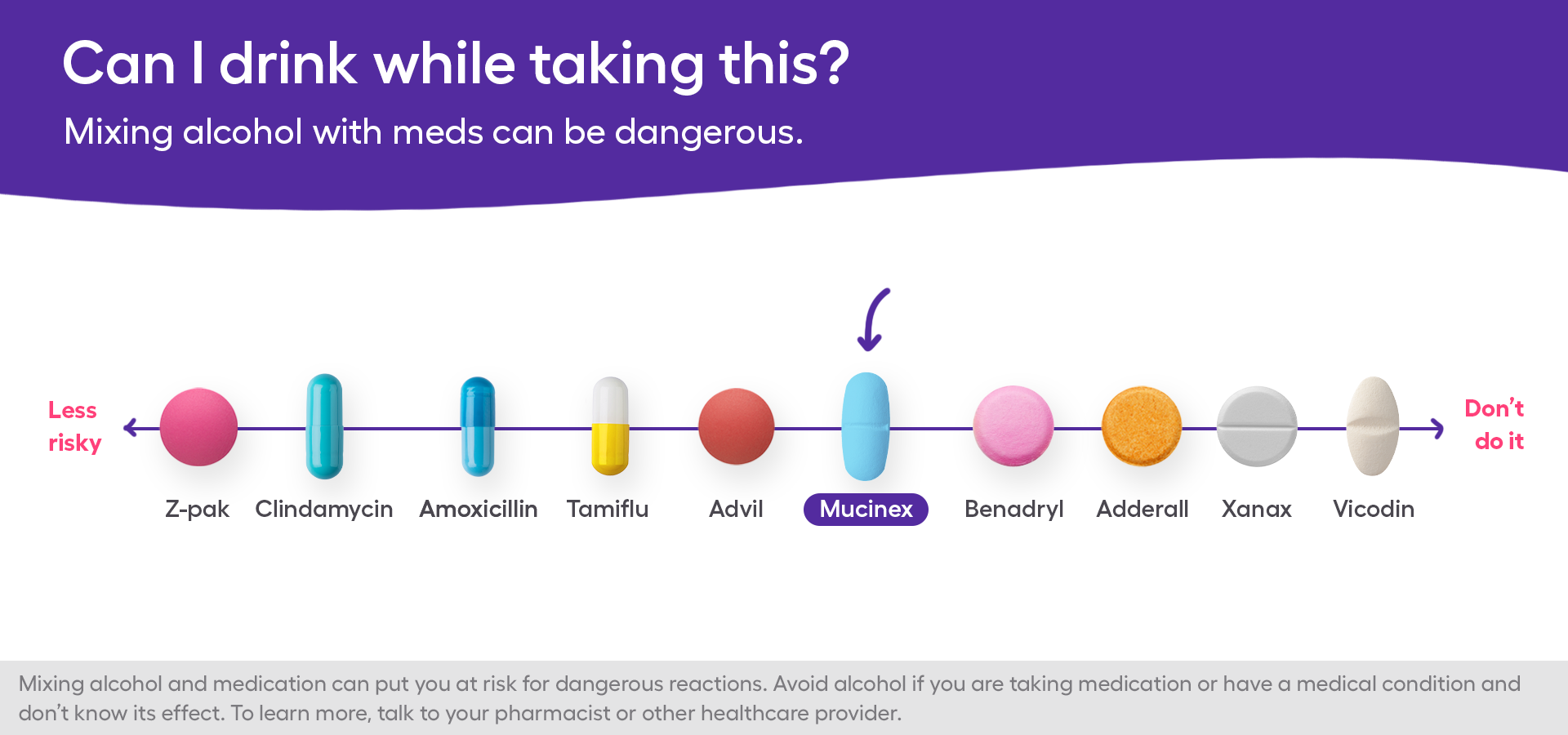Mucinex is a popular brand-name, over-the-counter medication used to treat symptoms of the common cold or flu. The main active ingredient is guaifenesin, an expectorant that helps thin and loosen mucus in the airways. While Mucinex has become a go-to remedy for many, the possible risks of combining this medication with alcohol are sometimes overlooked.
If you drink alcohol, even in moderate amounts, you might experience drowsiness, dehydration, and interrupted sleep. As a result, mixing Mucinex and alcohol could increase the side effects of Mucinex, worsen current symptoms, or affect your body’s ability to fight off the illness causing your symptoms in the first place. Therefore, it’s not typically recommended to mix Mucinex and alcohol. Keep reading to learn more about the potential for a Mucinex and alcohol interaction.
What’s in Mucinex?
Mucinex is a brand-name line of medications that relieve cold and cough symptoms. Although the main ingredient in many Mucinex products is guaifenesin, the active ingredients in Mucinex products can vary depending on the specific product.
In addition to guaifenesin, some Mucinex products also contain other active ingredients such as acetaminophen, dextromethorphan, phenylephrine, and triprolidine to target specific symptoms.
Mucinex product differences
Mucinex DM combines guaifenesin with dextromethorphan, a cough suppressant that helps control the coughing reflex. If you’re experiencing a dry, unproductive cough along with chest congestion, you might benefit from Mucinex DM. On the other hand, Mucinex Fast-Max includes a combination of guaifenesin, acetaminophen (a pain reliever and fever reducer also found in Tylenol), phenylephrine (a nasal decongestant), and dextromethorphan. This all-in-one form of Mucinex is meant to provide multi-system relief.
Mucinex products may come as extended-release tablets, liquid gel capsules, and liquids. In an average adult, the immediate-release forms, like the capsule and liquid, are usually taken every four hours, while the extended-release tablets are typically taken every 12 hours.
Always follow the directions on the packaging or consult a healthcare professional if you have concerns about the appropriate dosage. You shouldn’t combine any Mucinex products with other cough and cold medications, such as Robitussin. Doing so could lead to potential interactions or an overdose of the active ingredients, as many cough medicines contain the same ingredients.
Can you take Mucinex with alcohol?
It’s not recommended to mix Mucinex and alcohol. Combining alcohol with certain ingredients in some Mucinex products may lead to increased side effects that range from mild to severe. In severe cases, mixing alcohol with Mucinex can potentially result in liver damage, especially with high doses of Mucinex containing acetaminophen and long-term alcohol use.
If you choose to drink on Mucinex and have consulted a healthcare provider, limit your alcohol use to moderate consumption. That means no more than one to two drinks per day for men and no more than one per day for women. In addition, the FDA label for the nighttime forms of Mucinex containing acetaminophen recommends avoiding three or more drinks per day.
If you’ve already taken Mucinex, it’s recommended to wait until the medication’s effects clear from your system before consuming alcohol. That period might be four to 12 hours, depending on the Mucinex product you took.

The effects of taking Mucinex with alcohol
Alcohol is not known to directly interact with guaifenesin in Mucinex. However, it can amplify the side effects of other active ingredients in the Mucinex products. Mixing Mucinex with alcohol may cause various side effects, such as:
- Drowsiness
- Dizziness
- Nausea
- Vomiting
- Headache
- Weakness
- Stomach pain
- Liver damage
Additionally, there are some more serious side effects to be aware of when mixing these two substances.
Substance misuse
Mixing Mucinex and alcohol may increase the chances of substance misuse. As alcohol impairs judgment and decision-making abilities, individuals may be more likely to take Mucinex in larger doses than prescribed. In addition, people sometimes misuse Mucinex products containing dextromethorphan for its euphoric effects in high doses. Mixing dextromethorphan-containing Mucinex and alcohol could increase the risk of misuse, dependence, and addiction.
Hallucinations
In some cases, combining Mucinex and alcohol may cause hallucinations. This mainly occurs when Mucinex contains dextromethorphan, which is often misused for certain effects like euphoria and hallucinations. However, these effects are usually seen with higher doses than normal. Hallucinations may also be accompanied by confusion and dizziness, which might make it dangerous to do everyday activities like driving.
Increased risk of overdose
When Mucinex and alcohol are combined, the risk of an overdose on Mucinex may be higher. This puts people at a higher risk for life-threatening complications if the medication is taken in excessive amounts. People with a history of alcohol use disorder, in particular, may be at an increased risk of an overdose of Mucinex products containing dextromethorphan.
Increased risk of injury due to severe drowsiness or dizziness
Consuming alcohol suppresses the central nervous system and can amplify the drowsiness and dizziness caused by Mucinex. When under the influence of both substances, individuals may struggle with balance and coordination, making it more likely for accidents, falls, and other injuries to occur.
Liver damage
When Mucinex and alcohol are consumed together, there is a possibility of liver damage—specifically, the Mucinex Nightshift, Fast-Max, and Sinux-Max products, which contain acetaminophen, a medication that is known to cause liver damage, especially when taken in large amounts.
Liver issues may arise if you consume more than 3,000 to 4,000 mg of acetaminophen in 24 hours, take other drugs containing acetaminophen, or have three or more alcoholic drinks daily while using Mucinex products with acetaminophen. Therefore, healthcare providers recommend carefully watching your intake of acetaminophen.
Effects on the immune system
Alcohol may negatively affect your immune system’s ability to fight off infections, especially in people who drink large amounts over time. A weakened immune system could delay recovery, which may cause you to rely on medications like Mucinex to control symptoms. Frequent alcohol consumption can also disrupt sleep, a key part of maintaining a healthy immune system. Without adequate sleep, the body may be slower to repair itself.
Alcohol and cough medicines: Is it generally safe?
It’s a good idea to be cautious when considering combining alcohol and OTC cough medicines like Mucinex. Other cough medicines may contain ingredients like dextromethorphan or acetaminophen, which may have potential health risks in high doses. Consuming alcohol and OTC cold medications can lead to an increased risk of dizziness, drowsiness, and liver damage.
In addition, the FDA advises against mixing alcohol with OTC medicines containing decongestants like pseudoephedrine or phenylephrine. Doing so could lead to elevated blood pressure and heart problems, especially in people with high blood pressure or heart disease.
Read all medication labels and consult a healthcare provider for medical advice before consuming alcohol while taking medications for cough and cold symptoms.
Seek help for misuse
The misuse of medications like Mucinex, especially those containing dextromethorphan, is a serious concern. It may be helpful to recognize the signs of misuse to avoid potential health problems.
Signs of misusing dextromethorphan may involve taking the medication in amounts higher than the recommended dosages or using them for non-medical reasons, such as to feel euphoria. Other signs of misuse might include changes in behavior or mood, neglecting daily responsibilities, and using the medication more often than normal.
Physical symptoms of misuse might include dizziness, confusion, slurred speech, and uncoordinated movements. Psychological dependence is also a concern, as an individual may increasingly rely on medication to deal with stress or emotional problems.
If you or someone you know is misusing Mucinex products containing dextromethorphan, seek help as soon as possible. A trained healthcare professional can help provide guidance and support, and, if necessary, refer you to a specialist or treatment program. Treatment may include behavioral therapy, counseling, and support groups to work through the underlying reasons for misuse.
Bottom line: Avoid alcohol with Mucinex
It’s typically recommended to avoid mixing Mucinex and alcohol due to the risk of potentially serious side effects such as dizziness, drowsiness, a rapid heart rate, and liver damage. However, the risk of serious side effects is often higher in people who misuse products containing dextromethorphan or have a history of alcohol use disorder.
Even if you’re a healthy adult, there’s still a risk that drinking one alcoholic beverage may lead to complications while taking Mucinex. You may want to err on the side of caution and allow your body to rest and heal, as alcohol is known to weaken the immune system. If you’re considering drinking alcohol after finishing treatment with Mucinex, wait four to 12 hours after the last dose or a full day to be on the safe side.
Sources
- Alcohol: Balancing risks and benefits, Harvard School of Public Health (2022)
- Drug label information, DailyMed (2023)
- Dextromethorphan: A case study on addressing abuse of a safe and effective drug, Substance Abuse Treatment, Prevention, and Policy (2016)
- Dextromethorphan toxicity, Statpearls (2023)
- Acetaminophen safety: Be cautious but not afraid, Harvard Health Publishing (2020)
- Alcohol’s effect on host defense, Alcohol Research (2015)
- Alcohol and the sleeping brain, Handbook of Clinical Neurology (2018)
- Dextromethorphan psychosis, dependence and physical withdrawal, Addiction Biology (2005)











